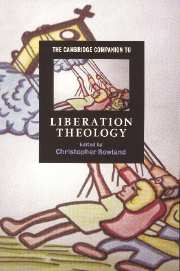Book contents
- Frontmatter
- Introduction
- Part one Contemporary liberation theology
- Part two Aspects of liberation theology
- Part three Analysis and criticism
- 8 Liberation theology and the Roman Catholic Church
- 9 Marxism, liberation theology and the way of negation
- 10 The economics of liberation theology
- 11 Political theology, tradition and modernity
- Epilogue: the future of liberation theology
- Select bibliography
- Index
9 - Marxism, liberation theology and the way of negation
from Part three - Analysis and criticism
Published online by Cambridge University Press: 28 May 2006
- Frontmatter
- Introduction
- Part one Contemporary liberation theology
- Part two Aspects of liberation theology
- Part three Analysis and criticism
- 8 Liberation theology and the Roman Catholic Church
- 9 Marxism, liberation theology and the way of negation
- 10 The economics of liberation theology
- 11 Political theology, tradition and modernity
- Epilogue: the future of liberation theology
- Select bibliography
- Index
Summary
In 1984 the Vatican's Congregation for the Doctrine of the Faith published an Instruction on Certain Aspects of the 'Theology of Liberation', known from the first two words of its Latin text as Libertatis Nuntius. The intention of this document was, it says, 'limited and precise', which was
to draw the attention of pastors, theologians, and all the faithful to the deviations, and risks of deviation, damaging to the faith and Christian living, that are brought about by certain forms of liberation theology which use, in an insufficiently critical manner, concepts borrowed from various currents of marxist thought.
The issue, then, was Marxism, or the use of it within some versions of liberation theology. The document is careful to point out that it offers no general criticism of liberation theology as such, at any rate insofar as liberation theology is defined by its response to the 'preferential option for the poor'; nor, it adds, should its criticisms of liberation theology on the score of its Marxism 'serve as an excuse for those who maintain an attitude of neutrality and indifference in the face of the tragic and pressing problems of human misery and injustice'. The Apostolic See, it goes on, has a good record of denunciation, for it 'has not ceased to denounce the scandal involved in the gigantic arms race', nor does it any longer tolerate 'the shocking inequality between rich and poor' the injuries of which to the poor, it notes, are aggravated by 'the memory of crimes of a certain type of colonialism'.
- Type
- Chapter
- Information
- The Cambridge Companion to Liberation Theology , pp. 199 - 217Publisher: Cambridge University PressPrint publication year: 1999
- 3
- Cited by



